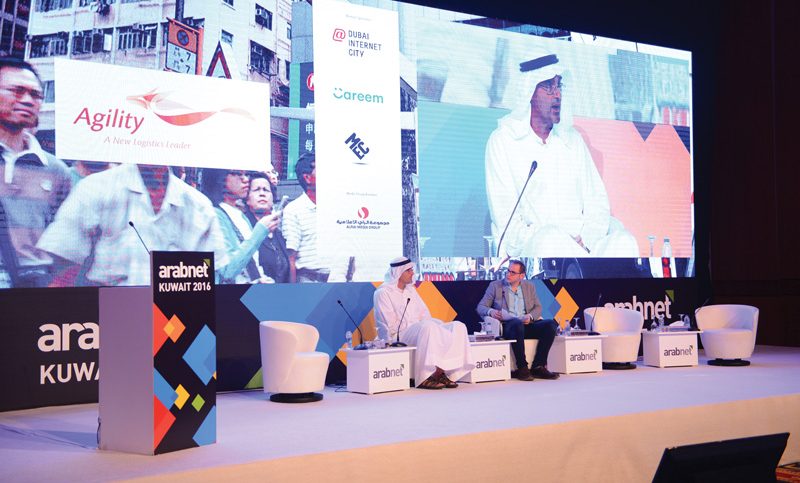By Lynn El Bizri
Founded in 1979, Agility started as a local warehousing provider in Kuwait and has grown to become one of the world’s largest integrated logistics providers in the Middle East. It has acquired more than 40 logistics brands around the world, invested billions to build a global network in emerging markets and today has more than 22,000 employees and operations in over 100 countries.
ArabNet’s CEO Omar Christidis sat down with Tarek Sultan, CEO and Vice Chairman of Agility, to discuss how technology is disrupting the Logistics Industry and Agility in particular.
Where has technology been integrated into your organization? What are the Top 3 areas in which technology has had a deep impact on the way Agility works?
First and foremost, with so many people and activities flowing through our business, we look at technology as a way to improve and enhance the way that we operate. The old way of doing business, using outdated technology, won’t help us in the near future so we needed to use technology to reduce our costs, make us more accessible to our customers and really make the company relevant to the new way of doing business.
To begin with, we are really transforming our core business using technology but we’re doing that both directly and indirectly. We’ve set up a team within Agility that is looking at new emerging technologies that could theoretically cannibalize or supersede our business or could be a part of enabling new business models moving forward. We’re also looking at investing in startups that will impact the supply chain of the future and at how we can integrate some of those concepts into the way we run our business today.
What shape does disruption in the logistics sector take?
The disruption is extreme and present in every aspect of our business. Historically you would see many large companies, such as shipping companies, with their capital invested in owning assets, whereas today, a lot of those assets are basically sitting empty or idle. In the future, I think those sorts of companies that are sitting on idle assets can leverage the technologies being pioneered today to turn their assets into more productive ones by opening up their usage to consumers and customers.
There are disruptions taking place that will be help traditional companies that own assets but there are also new ways of doing business that don’t require you to have those assets in the first place. Uber are probably the largest taxi company in the world and they don’t know own any taxis or assets per say. In the supply chain we talk about how can we leverage technology and increase efficiency, but there’s a whole host of other technologies that are changing the way that you conceive logistics. For example, there are electronic vehicles, and there are even companies making axles today that hook onto a truck’s trailer and reduce the fuel consumption of the truck going forward. Today you have a truck and a trailer, however you can envision a future where you won’t have a truck and the trailer will drive itself, recharge itself, refuel itself and will deliver the cargo to the customer.
How does Agility remain ahead of the innovation curve, what strategies do you use to foster innovation internally and how do you structure those kinds of teams internally to get the most out of your people?
We have a very clear and explicit strategy when it comes to technology and we are leveraging technology to fundamentally change the way our core organization works. When you try to develop new businesses and start to nurture new concepts, it’s difficult to do core business because the government doesn’t like businesses which consume cash and do not generate big profits. So any business that consumes cash and doesn’t generate profits in the corporate world is bad, meaning those businesses need to be separate and have a different strategy.
At Agility, we have a group that is investing in technologies in a way that’s complementary to our core business i.e. our core business can add value to their business. For example, there is a company that we invested in in Brazil that’s kind of like an UBER for trucking and our thought process behind that is by investing in a company like that we can generate a good return, use that same technology for our core business and give them business. So there are multiple areas of synergy there that we can extract and if you can get 4 or 5 or 6 different areas of synergy and a round of investment, usually that’s good business.
We’ve also set up a technology advisory board and engaged with investors (mostly startups) that are investing heavily in technology. We make them part of our business strategy and discuss and exchange ideas with them. They then help us validate if these ideas are worth investing in or not and sometimes they end up investing with us or we invest with them. That dialogue and synergy of networks and contacts is really helpful to us, especially being a company whose roots are not in technology. So we think we have a good formula for how to move up in the future and I think it’s going to really change our company. You’ll probably hear of some interesting projects over the next year or so coming out of Agility and I would imagine that 50% of them are going to be technology related.
Follow Lynn El Bizri online @lnlne, For more information about Arabnet, head to www.arabnet.me.








